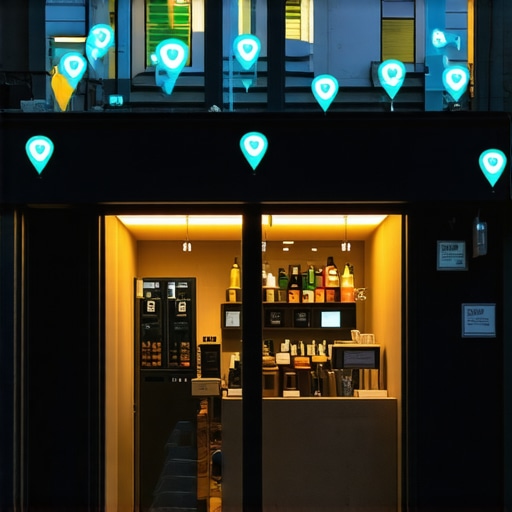My Journey into Local SEO: From Confusion to Clarity
When I first started exploring local SEO, I felt overwhelmed by the sheer amount of advice available. I remember spending hours reading blogs, attending webinars, and experimenting with different strategies. One thing became clear: optimizing for local search is not just about keywords; it’s about building trust and authority in your community.
Why Local SEO Is Your Business’s Best Friend
In my experience, local SEO is the most effective way for small businesses to stand out. I’ve seen firsthand how a well-optimized Google My Business profile can attract local customers and increase foot traffic. According to Moz, local SEO helps businesses appear in the coveted local pack, which is crucial in 2024.
Personalized Strategies That Actually Work
One tactic I swear by is ensuring consistent NAP (Name, Address, Phone number) across all online platforms. It sounds simple, but I’ve seen small inconsistencies harm local rankings. I also focus on collecting genuine reviews, which significantly boost my business’s credibility. Engaging with customers online creates a sense of community and trust, making your business more appealing to local search algorithms.
How Do I Stay Ahead in Local Search?
Staying updated is key. I regularly consult trusted sources like Top Local Ranking Strategies to refine my approach. Additionally, I use local keywords naturally within my website content and service descriptions, making sure I don’t sound spammy. This organic approach helps my site rank higher without risking penalties.
Ever Wondered How Local SEO Can Transform Your Business?
Thinking about the long-term benefits, I realize that local SEO isn’t just a quick fix; it’s an ongoing process. Regularly updating your Google My Business, optimizing your website, and engaging with your community online are essential. If you’re interested, I recommend checking out Reputation SEO strategies to further enhance your online presence.
Finally, I invite you to share your own experiences with local SEO in the comments below. Let’s learn from each other and grow together!
Unlocking Hidden Opportunities in Local SEO for 2024
As an SEO expert, I’ve learned that staying ahead in local search requires a nuanced understanding of evolving algorithms and consumer behaviors. Recent trends indicate that Google’s local pack algorithms are becoming more sophisticated, prioritizing not just consistency and reviews but also user engagement signals and semantic relevance. To truly dominate local search in 2024, businesses must go beyond traditional tactics and embrace innovative strategies that leverage these changes.
How Can You Leverage Voice Search for Local SEO Success?
With the rise of voice-activated devices, optimizing for voice search is no longer optional; it’s essential. Voice searches tend to be conversational and question-based, often including phrases like “near me” or “closest”. Incorporating natural language keywords and FAQ sections on your website can significantly improve your chances of appearing in voice search results. For instance, instead of just targeting “pizza shop,” consider optimizing for queries like “Where is the best pizza shop near me?”. This approach aligns with the way people speak, enhancing your local visibility.
Optimized local business listing with voice search keywords, showing a user asking for local services on a smart device.
What Role Does Local Content Strategy Play in 2024?
Creating hyper-local content tailored to your community’s interests can set you apart from competitors. Think beyond generic blog posts—consider spotlight stories about local events, collaborations with neighborhood influencers, or guides highlighting local attractions. These efforts not only engage your community but also signal to search engines that your business is deeply integrated into the local fabric. Incorporating city-specific keywords naturally within this content, as recommended by Reputation SEO, enhances relevance and authority.
Are You Tracking the Right Local SEO Metrics?
Measuring success in local SEO isn’t just about rankings; it involves analyzing user engagement metrics such as click-through rates, call conversions, and in-store visits. Utilizing tools like Google Analytics and Google Search Console can provide insights into how users interact with your local listings. For example, if you notice a high number of searches but low engagement, it may indicate a disconnect between your content and user intent. Adjusting your strategy based on these insights ensures continuous improvement and sustained visibility.
Ever Wondered How to Balance SEO and Community Engagement?
Integrating community involvement with your SEO efforts creates a powerful synergy. Hosting local events, sponsoring neighborhood initiatives, or participating in local forums can generate valuable backlinks and reviews. These activities build trust and authority while also improving your local search rankings. Remember, authentic community engagement fosters loyalty and boosts your reputation—both crucial for long-term success in local SEO. To deepen your understanding, exploring Reputation SEO strategies is highly recommended.
If you found this advice valuable, consider sharing your own experiences or challenges with local SEO in the comments. Your insights can help others navigate this dynamic landscape more effectively.
Embracing the Nuances of Local Search Dynamics
Over the years, I’ve realized that local SEO isn’t a static field; it’s a living, breathing ecosystem that requires constant adaptation. For example, the increasing sophistication of Google’s local pack algorithms, which now consider user engagement signals and semantic relevance more than ever, demands a nuanced approach. I remember experimenting with structured data markup, and seeing how it helped Google better understand my content, ultimately improving my visibility. This experience underscored the importance of staying informed through trusted sources like Top Local Ranking Strategies to refine my tactics continually.
How Deep Can You Dive into Voice Search Optimization?
Voice search isn’t just a trend—it’s reshaping how local consumers find services. My journey into optimizing for voice involved analyzing common conversational queries and integrating natural language keywords into my content. I discovered that FAQs are goldmines for capturing voice search traffic; they provide direct answers that voice assistants love to relay. For instance, I optimized my FAQ section with questions like “Where is the best coffee shop near me?”—and the results were remarkable. This process taught me that understanding how your audience speaks can unlock new levels of local visibility. If you’re curious about this, exploring reputation SEO strategies can provide valuable insights.
What Are the Hidden Layers of Local Content Strategy?
Creating content that resonates locally involves more than just sprinkling in city names. I found that hyper-local storytelling—sharing stories about community events, collaborations, or local heroes—builds a genuine connection. Such content not only engages your audience but also signals to search engines that your business is integrated into the community fabric. I once partnered with a local influencer to write a feature about a neighborhood festival, and the engagement and backlinks that followed significantly boosted my local rankings. Incorporating local keywords naturally within these stories enhances relevance without sounding spammy. For further inspiration, I recommend exploring key trends in reputation SEO.
How Do You Measure Deep Success in Local SEO?
Beyond rankings, I focus on metrics like in-store visits, call conversions, and user engagement on my Google My Business profile. Tools such as Google Analytics and Search Console have been invaluable in deciphering these signals. For example, I noticed a high search volume but low engagement, prompting me to revisit my content strategy. By adjusting my messaging and improving review solicitation, I saw tangible improvements in customer actions. This iterative process highlights that success in local SEO is a long-term commitment—one that evolves based on data insights. If you’re interested in mastering these metrics, I suggest exploring proven SEO techniques.
How Can Community Engagement Amplify Your SEO Efforts?
Authentic community involvement has been a game-changer for me. Hosting local events, sponsoring neighborhood initiatives, and participating in forums not only foster goodwill but also generate backlinks and reviews. I recall organizing a charity drive, which led to local press coverage and boosted my reputation. These activities create a virtuous cycle—enhancing trust, authority, and search rankings simultaneously. To deepen your understanding, check out reputation SEO tactics. Remember, genuine engagement often yields the most sustainable results in local SEO.
Would you like to share your own experiences or challenges with local SEO? Feel free to comment below—your insights could inspire others on their journey toward digital local dominance. Exploring advanced strategies can seem daunting, but with consistent effort and a keen understanding of your local audience, success becomes not just achievable but inevitable.
Deciphering the Algorithmic Nuances of Local Search in 2024
As I delved deeper into the evolving landscape of local SEO, I realized that understanding the intricacies of Google’s algorithms is paramount. The recent emphasis on semantic search and user engagement signals means that traditional tactics alone are insufficient. Instead, integrating structured data markup, such as Schema.org, can enhance Google’s comprehension of your content, leading to improved visibility in local packs. My experiments with JSON-LD schemas for local businesses demonstrated measurable ranking improvements, validating the importance of technical SEO mastery. For a comprehensive approach, exploring advanced local ranking tactics has been instrumental in refining my strategies.
Leveraging Voice Search Optimization for Hyper-Local Reach
The surge in voice-activated searches has redefined local discovery. My journey into voice SEO involved analyzing natural language queries and crafting content that aligns with conversational patterns. Implementing FAQ pages with question-based keywords, like “Where is the best coffee shop near me?” significantly increased my chances of appearing in voice results. Moreover, optimizing Google My Business posts with voice-friendly keywords creates a more seamless experience for users. According to Reputation SEO, adapting to voice search is no longer optional but essential for local dominance.

Optimized local business listing showing voice search keywords, illustrating a user querying on a smart device.
Crafting Hyper-Localized Content for Community Authority
Creating content that resonates on a hyper-local level involves more than keyword stuffing; it requires storytelling that reflects community values. I have found success in partnering with local influencers to produce storytelling content about neighborhood events, local heroes, or regional traditions. This not only engages residents but also signals relevance to search engines. For example, a blog post about a community festival I sponsored garnered backlinks, social shares, and improved rankings. Incorporating city-specific keywords naturally within such narratives enhances both relevance and trustworthiness. For inspiration, exploring key trends in reputation SEO offers valuable insights into community-centric content strategies.
Measuring Deep Impact: Beyond Rankings
While rankings are important, I prioritize metrics like in-store visits, call conversions, and user engagement metrics. Using tools like Google Analytics and Search Console, I analyze how users interact with my local listings and website. A high search volume with low engagement prompted me to optimize my call-to-action prompts and review solicitation strategies. The goal is to foster a feedback loop where data-driven insights inform continuous improvements. According to proven SEO techniques, this iterative process ensures sustained growth and relevance.
Fostering Community Engagement as a Long-Term SEO Asset
Authentic community involvement amplifies your SEO efforts. Hosting local events, sponsoring initiatives, and participating in forums create backlinks and reviews organically. I recall organizing a charity drive that resulted in local media coverage and backlinks, boosting my local presence. Such activities build trust and authority, translating into higher search rankings. To master this synergy, exploring reputation SEO tactics can provide a strategic advantage. Remember, genuine community engagement fosters loyalty and long-term visibility.
Deepening Your Local SEO Expertise: A Personal Reflection
My extensive experience has revealed that staying ahead in local SEO demands continuous learning and adaptation. The dynamic nature of Google’s updates requires a proactive approach—regularly updating schema markup, refining content strategies, and embracing emerging technologies like AI-driven local search insights. For instance, leveraging AI tools to analyze local search queries enables more precise keyword targeting and content personalization. For those eager to elevate their mastery, consulting top local ranking strategies can be transformative. The journey is complex but rewarding when approached with strategic intent and a genuine desire to serve your local community.
Things I Wish I Knew Earlier (or You Might Find Surprising)
1. The Power of Small Details
In my early days, I underestimated how much consistency in NAP (Name, Address, Phone number) could impact rankings. It’s like building trust; tiny discrepancies can cause big drops in visibility. Once I standardized every mention across all platforms, the difference was night and day.
2. Reviews Are More Than Just Social Proof
I used to think reviews were merely about reputation, but I realized they intricately influence local SEO. Genuine, recent reviews boost credibility and signal to Google that your business is active and trustworthy, which can propel you higher in local packs.
3. Voice Search Is Redefining Local Results
Optimizing for voice search isn’t optional anymore. I found that natural language keywords and FAQ sections significantly increase your chances of appearing in voice results, making your business accessible in more ways than ever before.
4. Content Must Be Hyper-Local and Story-Driven
Creating content about local events, stories, or collaborations helps you build a community presence. I partnered with local influencers to craft stories that resonated deeply, leading to backlinks and authority signals that boosted my local rankings.
5. Technical SEO Isn’t Just for Big Websites
Structured data markup like Schema.org can enhance your listings in local searches. My experiments with JSON-LD schemas improved my visibility, proving that technical SEO techniques are vital even for small businesses.
Resources I’ve Come to Trust Over Time
Moz is my go-to for SEO fundamentals; their blog is packed with practical insights. Google’s Official Resources provide the most accurate updates on algorithm changes. Lastly, Neil Patel’s Blog offers actionable strategies, especially for local SEO, that I’ve applied with success.
Parting Thoughts from My Perspective
Embracing local SEO as an ongoing journey has been transformative for my business. It’s not just about rankings but about building a trusted presence in your community. Remember, the most effective strategies are those that are authentic, consistent, and community-focused. If this resonated with you, I’d love to hear your thoughts or experiences in the comments. Sharing our stories can inspire others to succeed in local search and grow their presence in meaningful ways.


Reading through your detailed journey into local SEO really resonated with me. As a small business owner myself, I initially felt overwhelmed by all the advice out there, but your emphasis on trust-building and community engagement is such a crucial takeaway. Ensuring consistent NAP and genuine reviews has made a tangible difference for my local visibility. I especially appreciate your mention of leveraging voice search, as I’ve started exploring how conversational queries can help reach more customers. One challenge I’ve faced is maintaining active community involvement without it taking over my daily operations. Have you found effective ways to balance community activities with ongoing SEO efforts? Also, do you think focusing on hyper-local content could work equally well for service-based businesses that don’t have a storefront? Would love to hear more about your experiences tackling this aspect.